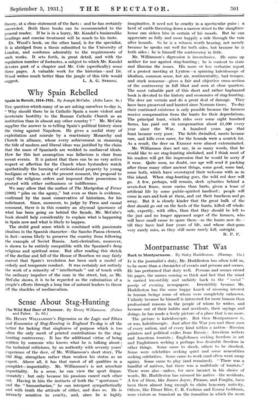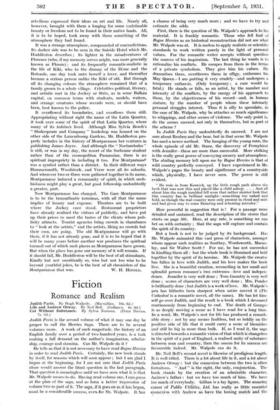Montparnasse That Was
Back to Montparnasse. By Sisley Huddleston. (Harrap. 15s.)
IT is the journalist's duty, Mr. Huddleston has often told us, to be more than a chronicler of events and persons and scenes. He has performed that duty well. Persons and scenes crowd his pages, the names coming so thick and fast that the mind is carried irresistibly and unfairly back to the " social "
gossip of evening newspapers. Irresistibly because Mr. Huddleston has the same happy knack of arousing interest in human beings some of whom were completely unknown. Unfairly because he himself is interested for more human than professional reasons in the people of whom he writes, and because out of their habits and accidents, their sayings and doings, he has made a lively picture of a place that is no more.
The picture is kaleidoscopic. But then Montparnasse is, or was, kaleidoscopic. Just after the War you met there men of every nation, and of every kind within a nation—Russian painters and political exiles from Russia ; American writers and American tourists ; Englishmen seeking freedom in art and Englishmen seeking a perhaps less desirable freedom in other things. Some came to shock, others to be shocked. Some were celebrities seeking quiet and some nonentities seeking celebrities. Some came to work (and often went away again). Some came to play (and remained). " There was a handful of natives, but there was a multitude of tourists." There were also—unless, for once inexact in his choice of words, Mr. Huddleston has misused his native—the residents. A few of them, like James Joyce, Picasso, and Foujita, have been there almost long enough to claim honorary nativity. Others, like Elmer Rice, C. B. Cochran and Emma Goldman, were visitors as transient as the transition in which the more
rebellious expressed their ideas on art and life. Nearly all, however, brought with them a longing for some undefinable
beauty or freedom not to be found in their native lands. All, it is to be hoped, took away with them something of the atmosphere they had found.
It was a strange atmosphere, compounded of contradictions. Its darker side was to be seen in. the Suicide Hotel which Mr.
Huddleston describes ; its lighter in the misadventures of Florence (who, if my memory serves aright, was more generally known as Flossie) ; and its frequently romantic-realistic in the life of Kiki, who to the dismay of the Dome and the Rotonde, one day took unto herself a lover, and thereafter became a serious person unlike the Kiki of old. But through all its changing colours the atmosphere remained that of a family grown to a whole village. Celebrities political, literary, and artistic met in the Jockey or Strix, as in some Balkan capital, on common terms with students, models, waiters, and strange creatures whose records were, or should have been, best known to the police.
It overflowed its boundaries, end overflows them still. Appropriating without right the name of the Latin Quarter, it took over some of the spirit of that Latin Quarter, where many of its habitués lived. Although Miss Sylvia Beach's " Shakespeare and Company " bookshop was housed on the other side of the Luxembourg Gardens, Mr. Huddleston pro- perly includes in the history of Montparnasse her ventures in publishing James Joyce. And although the " Noctambules " is still, or was in my day, the resort of the Sorbonne student rather than of the cosmopolitan Parnassian, there is no spiritual impropriety in including it too. For Montparnasse was a symbol rather than a district. In their different ways Hammersmith, Woodstock, and Veere were all its suburbs. And wherever two or three were gathered together in its name, Montparnasse induced a community of spirit, in which snob- bishness might play a great, but good fellowship undoubtedly a greater, part.
Now Montparnasse has changed. The Gare Montparnasse is to be the transatlantic terminus, with all that the name implies of luxury and expense. Theatres are to be built where the Jockey cnce stood. Restaurant proprietors have already realized the virtues of publicity, and have put up their prices to meet the tastes of the clients whom pub- licity attracts. Tourist agencies bring crowds in charabancs to " look at the artists," and the artists, liking no crowds but their own, are going. The old MontparnasSe will go with them, if it has not already gone, and it is to be hoped that it will be many years before another war produces the spiritual turmoil out of which such places as Montparnasse have grown. But when the place has gone our memory of it will remain. If it should fail, Mr. Huddleston will be the best of all stimulants. Kindly but not uncritically so, wise but not too wise to be beyond youthful jokes, he is the best of all chroniclers of the































 Previous page
Previous page